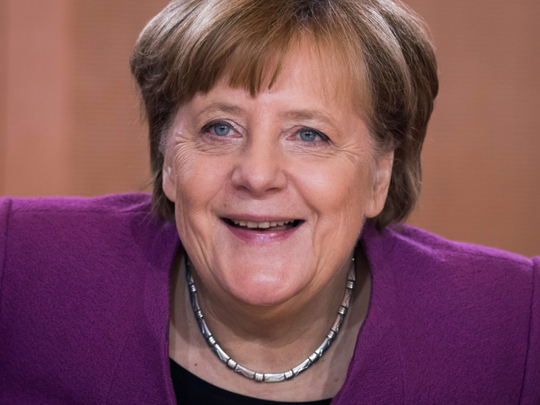
‘All political careers end in failure,” a British politician once said: Sooner or later everybody gets voted out, overthrown or forgotten. Even knowing that, four months ago nobody would have put Angela Merkel on a list of world leaders most likely to be knifed in the back. Back in September, the German chancellor was elected to a record-breaking fourth term. The formula she had relied on for years — project the image of a safe, frumpy housewife; take decisions slowly and carefully, if at all — defeated all rivals once again.
But although her Christian Democratic Party won more votes than any other, the result was still its worst ever. Since then, Merkel’s first attempt to build a coalition with three smaller parties failed, after the liberal Free Democrats dropped out. The second attempt — a “grand coalition” with the main opposition party, the centre-left Social Democrats — has ground towards a conclusion, with zero enthusiasm and no applause. The opposition SPD voted in favour of another grand coalition a few days ago.
But the scale of the collapse is notable: A few months ago, Merkel, master of the Centre ground, was lauded as the last hope of the West. Now she is toxic: Nobody wanted to share power with her party. What happened?
The answers don’t lie solely in Merkel’s controversial refugee policy, though that argument is made repeatedly. In fact, the unilateral and uncharacteristically spontaneous decision she made in 2015 to open Germany’s borders to refugees from Syria, has been quietly reversed. The numbers of people allowed to enter have dropped dramatically, and last year were only a third of what they had been in 2016.
Compromise loses
More to the point, this piece of history might help explain some of her lost electoral support, but it doesn’t entirely explain why no one wanted to govern with her. The situation is much weirder: It appears that in Germany, as almost everywhere else in Europe at the moment, the way to build your party and gain voters is not to hold power or to make decisions, but to attack those who do. Compromise and coalition, once the heart and soul of Continental politics, are losing their attraction. Besides, the public’s trust of everybody in government is at an all-time low — so much so that it seems better not to be in the government at all. When Christian Lindner, the liberal party leader, dropped out of coalition talks with Merkel, he declared that it was “better not to govern than to govern in a wrong way.” He also seems to have calculated that his party, which won more than 10 per cent of the vote in September, will do even better next time if it stays out. Now the Social Democrats are facing the same dilemma. With every passing week, as a decision on the coalition agreement draws closer, they lose ground in the opinion polls. Like the liberals, the Social Democrats are afraid that if they join the government their voters might disappear altogether. This week the party will announce results of members’ votes on the coalition deal, and may well be against it — in which case Merkel’s second attempt to form a government will fail. But for some of the party’s members, even a few ministries aren’t worth the price. Better to stay as far away from real power as possible
This strange truth has already given birth to strange politics in other countries. In the last British general election, all major political parties ran populist, “anti-elitist” campaigns. The Labour Party ran against the Tory “establishment”; the Tories ran against the pro-European “establishment”; the Scottish National Party ran against the English “establishment.” It was as if nobody wanted to admit that their party actually sought to wield power and become the establishment itself — which is, presumably, the only real reason to enter politics at all.
In its way, the victory of Emmanuel Macron in the last French presidential election was evid-ence of the same thing. Both he and his main opponent, Marine Le Pen of the National Front, made it into the final round of the election by attacking the traditional parties of the Centre left and Centre right, all of which suffered an unprecedented collapse. Then he took power — and his popular support immediately sank. Although more recently his support has once again begun to climb, the numbers suggest that French voters liked the idea of Macron as a candidate, but disliked the idea of Macron in power. But then, voters nowadays dislike the idea of anybody in power. All political careers end in failure — but most of them now begin in failure, too.
— Washington Post
Anne Applebaum is a columnist and Pulitzer Prize winning author who has written extensively about Europe. She is a visiting Professor of Practice at the London School of Economics.











